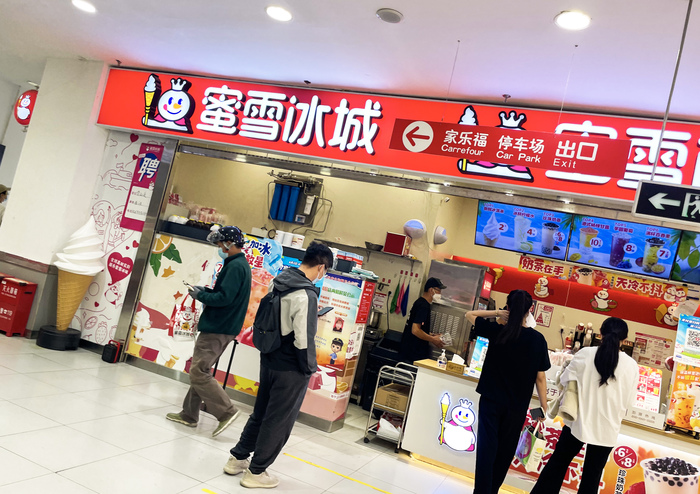Despite its low prices, Mixue has achieved remarkable financial results.

by Lu Yibei, Xie Xiaodan
Mixue Group’s recent debut on the Hong Kong Stock Exchange marked a major milestone in China’s fast-growing beverage industry. Opening nearly 30% above its issue price, the stock closed at HK$290, pushing the company’s valuation to HK$109.3 billion. This made Mixue the second-largest publicly listed food and beverage company in China, surpassing Haidilao and trailing only Yum China.
For franchisees like Zhu, who runs a Mixue store in a small town in Shangqiu, Henan, the listing was just another day of business. Every morning, she inflates the brand’s signature Snow King mascot outside her shop, drawing in crowds from the town’s busiest intersection.
Zhu joined Mixue in 2020, during the COVID-19 pandemic, and had to go through rigorous training at Mixue’s academy before opening her store. Her journey mirrors the rise of Mixue, which became the world’s largest made-to-order beverage chain, supported by nearly 20,000 franchisees.

Mixue now operates 46,479 stores worldwide, a staggering figure compared to its humble origins. In 1997, Zhang Hongchao, a 19-year-old from Henan, opened a small shaved ice stand called “Cold Wave.” He could never have imagined that 28 years later, his brand would serve 9 billion drinks annually—enough to circle the Earth 40 times or travel between the Earth and Moon twice.
Mixue’s success stems from its affordability. While competitors like Heytea and ChaPanda emphasize premium ingredients, Mixue offers ice cream for just 2 yuan and fresh lemon water for 4 yuan, targeting China’s massive lower-income demographic.
Despite its low prices, Mixue has achieved remarkable financial results. The company generated 13.6 billion yuan in revenue in 2022, 20.3 billion yuan in 2023, and 18.7 billion yuan in the first nine months of 2024, reflecting a 21.2% year-over-year increase. Its gross margin of 32.4% and net margin of 18.7% significantly outperform its peers.
Franchise expansion and supply chain mastery
Mixue’s franchise model is unique. Unlike many companies that rely heavily on franchise fees, Mixue earns only 2.4% of its revenue from these fees. Instead, its core business revolves around supplying ingredients and equipment to its franchisees. This strategy has transformed it into a vertically integrated supply chain powerhouse.
Zhang’s journey into supply chain control began in 2012 when he established Mixue’s first central factory to produce ice cream powder. Over time, the company built a vast logistics network, allowing it to standardize products and maintain ultra-low prices.
Its largest facility, Daka International in Wenxian, Henan, produces everything from ice cream mix to fruit jam. By self-manufacturing 60% of its ingredients and eliminating intermediaries, Mixue achieves industry-leading cost efficiency.

Mixue’s logistical reach is extensive. It operates 27 warehouses covering 350,000 square meters, ensuring same-day or next-day delivery to over 4,900 towns across China. This rapid distribution is essential, particularly for franchisees in remote areas with limited access to mainstream logistics services. Even in small towns like Zhu’s, Mixue’s supply chain ensures that fresh ingredients arrive promptly.
A prime example of Mixue’s supply chain dominance is its control over lemon prices. In 2023, the company procured 115,000 tons of lemons—more than 4% of China’s total consumption. By directly sourcing from Sichuan’s Anyue County, Mixue stabilizes prices and secures high-quality produce, avoiding the price surges that previously plagued its operations.

The digital leap and capital injection
Mixue’s expansion was accelerated in 2020 when it secured its first and only external funding round. Hillhouse Capital, Meituan DragonBall, and CPE Yuanfeng collectively invested in the company, with Hillhouse leading the round with a 933-million-yuan investment. The capital infusion allowed Mixue to scale its supply chain and digital infrastructure.
Hillhouse also provided expertise in digital operations, offering insights into O2O strategies, IT systems, and private domain traffic management. Key executives, including Mixue’s CFO Zhang Yuan, were brought in from Hillhouse to oversee financial and operational improvements. These enhancements helped Mixue sustain its rapid growth, adding over 8,000 new stores annually between 2022 and 2024.
Challenges and the path forward
Despite its dominance, Mixue faces challenges. Its tightly controlled supply chain limits product innovation. While competitors like Guming launch up to 11 new products per month, Mixue averages just five. Its reliance on bulk purchasing also restricts it to a narrow selection of ingredients—fresh fruit like strawberries and mangoes are absent from its menu, replaced by syrups and frozen purees to maintain consistency and cost efficiency.
Additionally, market saturation looms. Mixue estimates that China can support a maximum of 45,000 stores. With 40,510 domestic locations as of early 2024, the company is approaching its expansion ceiling. Based on its current growth rate of 25.3% for new stores, it could reach saturation within a year.

To sustain growth, Mixue is aggressively expanding overseas. In 2023, Zhang Hongfu, Zhang Hongchao’s brother and Mixue’s co-founder, toured Southeast Asia to scout new markets. Unlike their early days of traveling by bus, this time, the team flew in a private jet, reflecting their ambitions. The company has rapidly expanded in Vietnam and Indonesia, where it now operates 1,304 and 2,667 stores, respectively, making it Indonesia’s largest tea and coffee chain.
However, rapid international expansion brings new challenges. In May 2023, supply shortages disrupted Mixue’s Southeast Asian operations, highlighting the need for localized sourcing. Learning from past experiences, Mixue has swiftly responded by investing in overseas supply chain infrastructure. In 2022, it partnered with Xidodo Foods to build a coconut processing plant in the Philippines. In early 2023, it announced plans to expand production in Hainan, leveraging the free trade zone’s policies to streamline global logistics.
For Zhang Hongchao and Zhang Hongfu, the journey from a small ice cream stand to a billion-dollar empire has been marked by relentless expansion and supply chain mastery. Yet, their next challenge is clear—scaling Mixue into a global brand while maintaining its signature affordability. As competition intensifies and markets mature, their ability to adapt will determine whether Mixue’s success story continues to unfold on the world stage.